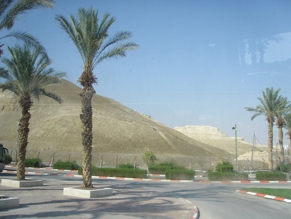|
World Jewish News

Allenby Bridge (photo by travelblog.org)
|
Jordan bombing: Good intelligence, poor execution
15.01.2010, Israel and the World A combination of high-quality intelligence and what appears to have been poor execution is what emerges from initial information about the failed attempt to assassinate Israeli diplomats in Jordan on Thursday.
Whoever placed the bomb targeting the two armored embassy vehicles on their way from Jordan to the Allenby Bridge appears to have had very good intelligence. They knew that many Israeli diplomats, who normally live in Amman without their families, usually depart for Israel for the weekend on Thursday afternoon, and they knew how to identify the two-car convoy.
This sort of information requires thorough preparation and surveillance of the embassy's routine activities. Consequently, it can be assumed that some of the rings of security around the embassy, which is one of the most threatened Israeli embassies because it is situated in an Arab state, have been penetrated.
On the other hand, the explosive device caused relatively little damage to the cars. This may stem from its limited strength, from some problem with the device itself, or from poorly timed detonation.
The most likely suspects in the attack are either Al-Qaida and global jihadists - in other words, Sunni extremists - or Shi'ite Hezbollah. Al-Qaida and its allies are active in Jordan, and in 2005, they carried out a major suicide bombing of hotels in the Jordanian capital.
Hezbollah still has unfinished business with Israel over the assassination of its terrorist mastermind Imad Mughniyeh. The group blames Israel for his death in February 2008 in Damascus, and has since tried, apparently at least 10 times, to avenge itself by hitting Israeli targets throughout the world. Its latest ambitious effort occurred in Turkey last year, but was foiled. Another foiled attempt occurred in Baku, Azerbaijan in May 2008, when, together with Iran, it tried to blow up the Israeli embassy with a booby-trapped vehicle.
Israeli security sources say the Mughniyeh assassination, along with a series of other mysterious incidents in Syria and Lebanon that Hezbollah attributes to Israel, have upset the balance of deterrence as far as the radical Shi'ite organization is concerned. Thus from its point of view, it must execute an appropriate retaliation. As a result, further attacks to avenge the alleged Israeli attacks were expected - and assassination has long been the organization's preference, because it has an element of "an eye for an eye."
Jordan's security services, which control the country by taking stringent measures against terrorism and against those considered enemies of the royal family, began investigating the incident Thursday. It can be assumed that they are receiving assistance from Israeli intelligence. Security ties between the two countries are close, despite the periodic tensions between King Abdullah and Israeli government leaders.
From the Jordanians' point of view, they have failed at providing security to the Israeli representatives. This is Jordan's second serious incident of terrorism against a friendly state in recent weeks: In December, a Jordanian suicide bomber blew himself up in a CIA compound in Afghanistan, killing seven American agents. The bomber was a double agent, and he also killed the senior Jordanian intelligence officer who was his handler.
This latest attack may force Israel to beef up security at its missions abroad. It may also lead to new regulations that would force diplomats in high-risk countries to further restrict their movements and cut down on overseas visits by Israeli VIPs.
Haaretz
|
|
